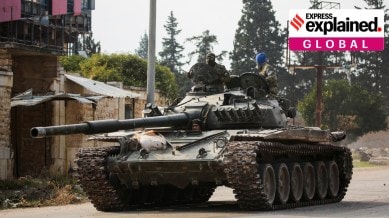Rebel offensive in Syria: What is happening now and why?
Syrian insurgents led by the Hayat Tahrir al Sham, formerly affiliated with al Qaeda, seized control of Aleppo, the country's second-largest city on Friday. This has triggered a fresh wave of conflict amidst a 13-year-long civil war. We explain.

In what has been described as a “shock offensive”, Syrian rebel forces concluded a three-day attack towards the city of Aleppo on Friday (November 29), marking a major movement in the Syrian civil war that began in 2011.
The conflict lay dormant since a ceasefire was negotiated in 2020, which is why recent developments have come as a surprise. In response to the advance, the government of Syria and Russia have united forces to regain control of rebel-occupied territory. On Sunday, Reuters reported their jets struck the rebel-controlled Idlib province in northwestern Syria, resulting in continued bombing for the second day. The strikes aimed to force the retreat of insurgents who stormed into Aleppo.
The rebel attack was also the first time since 2016 that opposition forces have seized territory in Aleppo. Here is what we know and why recent events are significant in the region, which is already mired in the Israel-Palestine conflict.
What we know about the surprise attack in Syria
Syrian rebels led by the extremist group Hayat Tahrir al-Sham (HTS), which has retained control of Idlib since 2020, advanced eastward on Wednesday toward Aleppo, the second-largest city in the country. Two days later, Syrian insurgents seized control of Aleppo, forcing the Syrian army to redeploy and announce a “temporary withdrawal”. On Saturday, the military said they had lost dozens of soldiers to the fighting.
This offensive reignited a conflict that had been all but contained in this region.
On Sunday, Syrian rebel forces reportedly turned their approach southward and attempted to capture control of Hama, a city south of Aleppo. President Bashar al-Assad on Sunday vowed that Syria would “defend its stability and its territorial integrity in the face of terrorists and their supporters”, according to the state news agency Sana.
What is the Syrian civil war and who controls what?
The Syrian civil war began around the “Arab Spring” of 2010, dubbed so as many countries in the Middle East and North Africa saw uprisings against authoritarian governments that had been in power for decades. In some nations, such as Tunisia and Egypt, ruling governments were forced out. In most others, governments and militaries crushed the movements.
The Internet and social media websites such as Twitter, which were then taking off, were believed to have played a role in the spread of pro-democracy ideas in the region. Foreign governments, such as the United States and Russia, also responded to the events based on their respective strategic interests.
In Syria, protests began against the rule of President Assad, who came to power in 2000. Today, he controls major parts of the country, barring a few regions. These include Kurdish-majority areas in east Syria, parts of the south, and parts of the Syrian desert ruled by offshoots of the group affiliated with the erstwhile Islamic State.
In March 2020, Turkey (which has historically backed Syrian rebels) and Russia (which has allied with the Assad regime) entered into a ceasefire deal in Idlib. This has remained in place, with the HTS retaining de facto control of the province since then.
HTS is a former al-Qaeda affiliate previously known as Jabhat al-Nusra (Al Nusra Front) and designated a terrorist group by the US, Russia and Turkey, among other nations. However, Turkey’s links to HTS are complex. A Financial Times report points to a mutually beneficial relationship, with Turkey serving as “Idlib’s ultimate protector from large-scale attacks by regime forces and their Russian backers, while Ankara also controls the border into the province, through which HTS depends on trade and taxes.”
Significance of the current Syrian offensive
The latest rebel offensive marks the strongest effort by the rebels in recent years. However, Assad quelled a similar rebellion in Aleppo in 2016 with Russian air support. A similar effort is presently underway.
The surprise attack also highlights the regime’s present vulnerability, with its allies being occupied in other military operations. Assad counts Iran and the Iran-backed Lebanese militant group Hezbollah among his allies but Israel, allied with the US, has been fighting Hezbollah in Lebanon over its support to the Palestinian militant group Hamas. Russia has also been at war with Ukraine since February 2022.
While Israel and Lebanon entered into a provisional “permanent” ceasefire on November 27, the Times of Israel on Thursday reported that the Israel Defense Forces (IDF) had identified truce violations and carried out two airstrikes on Hezbollah assets in southern Lebanon. It could mean that despite recent efforts, peace may be elusive in the region in the short-term.